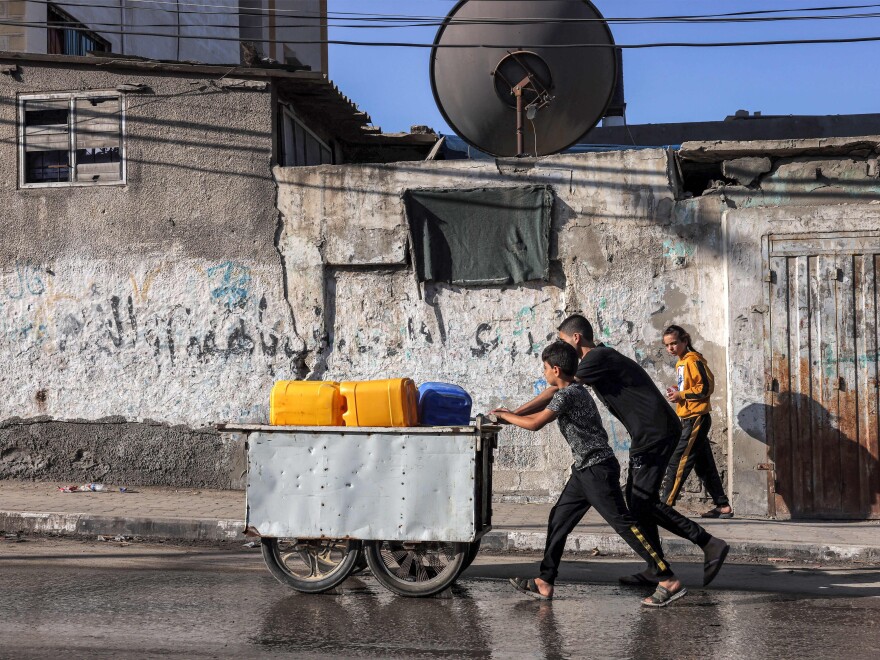Loading...
Israeli forces that swept into the north of Gaza have taken up positions near vital water infrastructure, satellite imagery from the commercial company Planet reveals.
Imagery from Nov. 6 shows Israeli armored vehicles arrayed around a seawater desalination plant on the north side of Gaza City and immediately next to a sewage treatment facility to the south.
The water facilities were all occupied shortly after Israeli ground troops moved into Gaza on Oct. 27. Planet imagery suggests that Israeli forces had reached the desalination plant by Oct. 30. Troops reached the wastewater treatment plant south of Gaza City on Nov. 1, according to imagery from Planet and the European Space Agency's Copernicus satellites.

A third facility, a sewage treatment plant immediately adjacent to Gaza's border with Israel, appears to have drained its treatment basins within days of the Oct. 7 attack by Hamas, according to Planet imagery. But the imagery did not show evidence that Israeli forces are operating near the facility.
The Israel Defense Forces declined to answer NPR's queries about the facilities, saying it did not comment on operational activity. Speaking on Monday on ABC News, Prime Minister Benjamin Netanyahu said that Israel would likely take responsibility for security in Gaza "for an indefinite period."
Loading...
Simply occupying infrastructure like water and power facilities does not necessarily violate the laws of war.
"Infrastructure in warfare is protected," says Marc Garlasco, a former United Nations war crimes investigator who now works for the Dutch non-profit PAX. Israeli forces cannot damage or destroy facilities designated essential for human life, he says, but "just because the Israel Defense Forces are operating around them does not mean they're doing anything nefarious."
Gaza has long suffered from water and sewage issues. The tiny strip has little surface water, and many of its wells are brackish. It depends on water piped in from Israel, and more recently, a trio of desalination plants that operate along the Mediterranean Coast. Those plants, along with several new sewage treatment facilities, have been funded in recent years by international bodies such as the World Bank, the European Investment Bank and the Islamic Development Bank.
Loading...
Water and sewage treatment has been mostly inoperable in Gaza for weeks, according to the Palestinian Water Authority. Fuel and electricity shortages led to the shutdown of wastewater and desalination facilities since mid-October, according to information on the authority's Facebook page. Additionally, Palestinian officials say Israel's extensive bombing campaign has damaged pipes and sewers throughout Gaza City.
Israel also shut off pipes that supply water from its territory to Gaza shortly after the Hamas attack on Oct. 7. It has since resumed piping water to parts of southern Gaza.
But fresh water still remains scarce throughout Gaza. On Wednesday, the World Health Organization warned that a lack of desalination had significantly increased the risk of bacterial infections like diarrhea throughout Gaza. Damaged water and sanitation systems have further increased the risk of disease outbreaks. Since mid-October, the WHO says that diarrhea cases have increased dramatically, with half of all infections in children under 5. Cases of skin rash, chickenpox, scabies and lice are also rapidly on the rise.

In addition to the water facilities, the satellite imagery from Planet also shows that Israeli forces have taken up positions in several school buildings throughout North Gaza. The imagery shows Israeli armor parked in courtyards, with additional strong points nearby.
When it comes to the laws of war, school buildings are not protected so long as students aren't present, Garlasco says. The decision to use schools is often a tactical one, because the design of many schools offer cover from the enemy, he says. "It's a building, with a wall around a courtyard, and militaries like that because it's protective for them."
But the use of schools by militaries has caused problems in the past. In Iraq, in 2003, for example, the U.S. 82nd Airborne Division operated out of a school in Fallujah. Iraqi citizens protested, leading to an incident that killed 17 civilians and wounded 75.
Garlasco says that while controlling these kinds of civilian facilities may make sense to the Israeli military in the short-term, he hopes they will hand them back as soon as the fighting is over.
"Gaza is a very dynamic situation," he says. "But you definitely want schools and other civilian infrastructure turned back over to the population as quickly as possible."
NPR's Daniel Estrin and Linah Mohammad contributed to this report. contributed to this story
Copyright 2023 NPR. To see more, visit https://www.npr.org.




